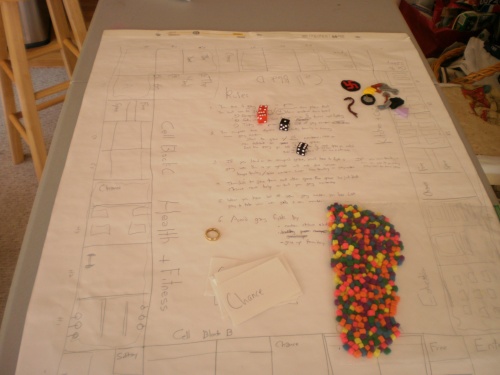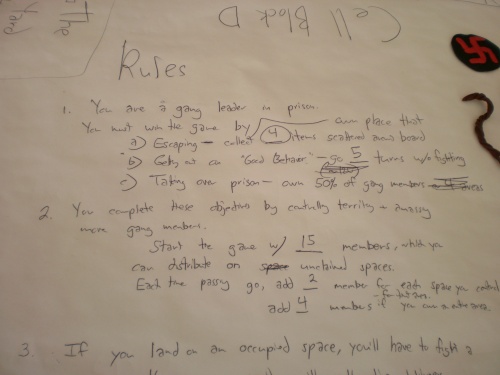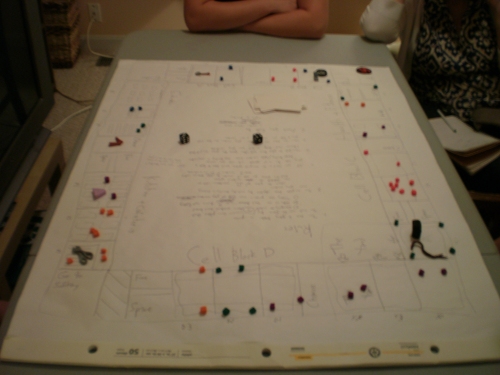Batman: Arkham Asylum arrives in the midst of a raging battle over the caped crusader’s identity. No, I’m not referring to the recent comic book storyline during which various parties fought over the cowl after Bruce Wayne’s apparent death. I’m talking about how we want to view Batman and write him. For much of his existence, we (and gotham city) have accepted Batman as an unalloyed good. But his 70-year history is also marked by concerns about the actions and the motives of the dark knight. In the fifties, Fredric Wertham famously argued that Batman and Robin were gay lovers, a claim that has dogged their partnership ever since.* In the past 30 years, we’ve been more concerned that Batman is nothing more than a vigilante, and that his nocturnal behavior, style, and argot are signs of insanity that mirror his oppopents. Most recently, The Dark Knight connected Batman to the heated discourse on the Bush Administration’s practices of unwarranted surveillance and torture. And in his home medium, comics, Batman’s books are sites of moral ambiguity and disturbing violence.
*Wertham may have been a vulgar Freudian, but many of his other claims were on the money–Wonder Woman does have clear a bondage subtext, after all. Consider that, at the very least, Robin’s apprenticeship under Batman constitutes child endangerment (a fact wonderfully dramatised in Frank Miller’s loony All-Star Batman and Robin the Boy Wonder).
Take this baggage, and add it to the burden video games carry. People have always worried about the hypnotic effects of mass media, from dime novels to war propaganda to television. To some, interactive media take this a step further, in that participants feel like they’re exercising control in a universe whose rules, nonetheless, limit their options. The choices developers and players make with Batman don’t just contribute to user expectations about violence–they contribute to the way we understand Batman’s position on the subject. Let me try to put that another way–if traditional action video games shape player feelings toward violence and crime on a visceral level (a big if, but this column really isn’t about that issue), a Batman video game has the potential to shape player feelings toward violence and crime on a philosophical level as well.**
** Not that regular video games can’t converse on these subjects philosophically, but they’re usually doing so as subtext–Batman’s stance on, well, Being Batman has a way of floating to the surface.
I’m not taking the arguments for Batman’s ambiguous morality all that well. This guy doesn’t take justice into his own hands–he makes citizen’s arrests. The folks who try to make the argument that Batman loves hurting people or that he is insane usually have to dress up their points with material that feels somewhat out of character (think of when Miller’s Batman chooses the second-most-lethal option when incapacitating criminals). I’m more willing to entertain the idea that Batman violates civil liberties, but I don’t think we’ve seen the definitive case on that, either. His villains are mostly escaped convicts who are making very public threats on Gotham. He’s probably not as good a role model as Superman, but I still consider Batman a hero.
Batman: Arkham Asylum is mostly a triumph in that regard. Its gameplay asserts the basic goodness of Batman while stressing the complexity of his work. The game’s story is that Batman has arrested the Joker and taken him to Arkham Asylum. Sensing that something is wrong, Batman follows Joker through admissions, and when the Joker makes his move, Batman leaps in, attempting to save the guards, arrest escaped criminals, and foil the Joker’s goal of creating a super-powered army. Batman makes use of a believably limited set of tools to manuever the buildings and fight criminals.
Batman’s moral calculus in the game is strong. He never has to sacrifice the safety of Arkham employees to further his ultimate goal of recapturing the Joker. He fights to disarm and knock criminals unconscious, not to kill or maim them. There are exceptions to this, unfortunately. At one point in the game I was able to use the Batclaw to throw criminals into an endless pit. I wish this wasn’t possible. Our confidence in the hero and his mission is backed up by Kevin Conroy’s authoritative voice (you may remember him as the voice of Batman on Batman: The Animated Series, which was created by Arkham Asylum writer Paul Dini).
Of course, his villains hold themselves to different standards.*** As you progress through the game, the dead bodies of guards accumulate on the grounds of Arkham Island. The interiors are splattered with survival-horror gore. Batman collects patient interviews conducted at Arkham during the course of the game, which spell out the severity of its inmates’ afflictions, and the hopelessness of reforming them. We also learn, through various pieces of the backstory, how the Asylum asserts its own malevolent influence on both inmates and workers. In this environment, Batman’s refusal to kill his villains (instead, he funds their rehabilitation) seems stubbornly optimistic. Batman has been painted with many labels, but “Idealist” usually isn’t one of them.
*** Batman has the best rogue’s gallery not simply because each villain helps refine an aspect of Batman’s personality, but because his villains have such rigourous standards in the first place. Over time we’ve developed a fine sense of what’s acceptable behavior in the minds of the Joker and Two-Face. You won’t catch these folks in the same kinds of contradictory behavior that mark a villain like Magneto–although Mag’s certainly interesting in his own right.
I’m a very casual gamer (1/3 of the games I own for the PS3 involve Batman), but I had a lot of fun playing this. The fighting flips the script on survival horror–call it thrival horror–because Batman’s so prepared, and he really can take out everyone, no guns needed. The detective vision feature allows you to identify criminals before they can see you. The melee is mostly button-mashing, but the game’s sense of timing is acute. My favorite part of gameplay is hunting for criminals in a large room, taking out armed guards from above or below, setting off timed explosives to drop a wall on a guy, or separating a man from his party with a batarang. It can get repetitive, but in a fun way, as the criminals get more anxious and make more mistakes as you pick them off, one by one. Unfortunately the game is very short, and the boss battles are lamely predictable. If you’ve played one just one action game, you’ll know how to take out every boss on your first go. I expected more from them. These are criminals who have tested their mettle against Batman time and again; they should be able to dream up more imaginative fight scenarios. It’s also a little too tempting to complete the entire game in Detective vision, searching for the Riddler’s trophies and stray criminals.
But several qualities of the game make for an immersive experience. The Riddler puzzles shouldn’t be so easy to solve (I would definitely welcome a more puzzle-oriented Batman game), but they were fun to collect and forced me to explore every nook and cranny of the island. The opening sequence, in which Batman follows Joker through Intensive Care, was stunning in its ability to suck me in, deeper and deeper, without giving me the chance to get my bearings. I love how Batman knows he’s walking into trap after trap, and does it anyway–how even after he clears area after area, it’s the Joker who is actually consolidating his control of the island. The Scarecrow sequences got a little repetitive, but delivered on verve.
Mark Hamill, as the Joker, carries the game. He makes bad lines good and good lines great. The Joker is a constant presence in the game, appearing on loudspeakers and a closed-circuit tv system. He even starts to tease his guards as you take them out, one by one.
In short, it’s not the sandbox-y Batman I long for, and it could use some good puzzles, but Arkahm Asylum is a remarkably satisfying experience.

 Yes, one of the game pieces is a swastika. No, this was not my idea. Pieces represent Bikers, Aryan Brotherhood, the Westside crew, Asian Triad, the Latin Kings, and others.
Yes, one of the game pieces is a swastika. No, this was not my idea. Pieces represent Bikers, Aryan Brotherhood, the Westside crew, Asian Triad, the Latin Kings, and others.